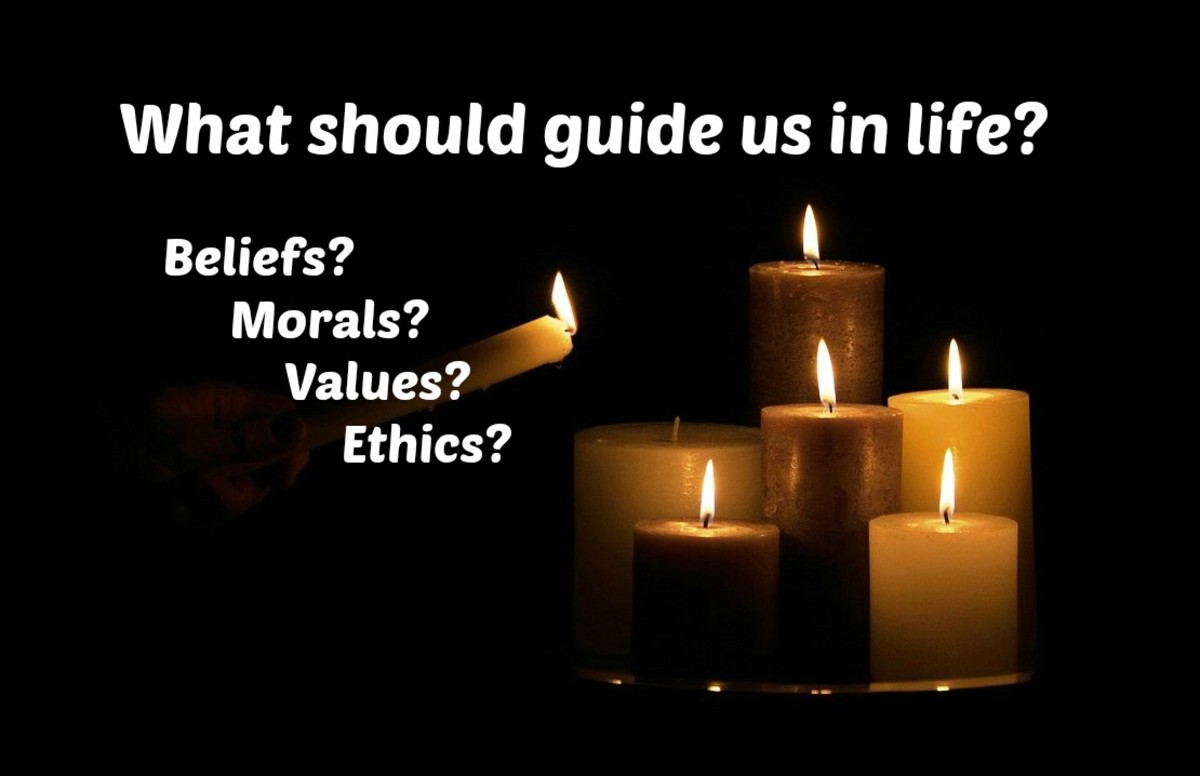An Approach to The Theist and Non-Theist Worldview in Pluralistic Society

The Background
In discussion with another hubber in a Hubpages forum thread, I suggested his approach of using ridicule with the intention of trying to eradicate religion is unhelpful. Mark asked what my approach would be. Fair question, but the answer was too long for a thread post. So this hub was born as my answer to the question:
And what is your approach exactly? Because the nature of theist belief makes compromise utterly impossible without force applied. Or do you not read any history books?
As I understand it Mark is arguing that the eradication of certain types of theistic belief is necessary, because the nature of such belief makes compromise with those holding it, impossible. So using ridicule to try to eradicate it, is better than using other (more harmful) forms of force used in the past to bring about social change. If that's not a fair summation of Marks' view, I'm sure he'll be happy to elucidate. So what would my approach be?
1. Find the Question
First I'd make sure I was asking the right question. Is the right question, 'how do we eradicate religion peacefully?' Clearly for some that's the objective, but knowing the aim of that objective will tell us if this is the right question to ask. It's also sensible in my opinion to examine the aim before suggesting an approach, because the aim will determine the approach to some degree. So what's the wider aim?
This particular discussion revolves around the negative effects on society that certain theistic belief are perceived as having, rather than opposition on philosophical grounds. So the aim relates to the social impact of certain theistic beliefs.
Examining the issue of social impact, we can see that 'compromise' and the ability to compromise is a key concept in the discussion for those whose objective is to eradicate certain or all theistic belief. The belief that compromise is 'utterly impossible' transforms the non-theist question of 'how do we compromise with those who hold theistic belief?' into the anti-theist question 'how do we eradicate certain forms of theistic belief?' So the concept of compromise is clearly important.
But if the question presented is 'how do we eradicate certain theistic belief peacefully?', and that question stems from the belief that compromise is impossible. Then I think the next question up the chain in our search for the wider aim, is 'what's so good about compromise?' Why is it desirable?
Compromise is generally defined as a settlement of differences where each side makes concessions. To settle is to bring about a desired state of affairs, to end opposition etc. So compromise is desirable as a means to that end; The restoration of calmness, and end or a lessening of opposition. In short greater harmony.
Groups holding different, opposing beliefs brings about opposition and disharmony. So the aim of eradicating certain theistic beliefs is to increase harmony, or lessen disharmony in society. 'Eradicate certain or all theistic beliefs peacefully' is therefore an answer to the question, 'How do we create, maintain or increase harmony in our societies?' or the converse, 'How do we eliminate, limit or reduce disharmony in our societies?'
2. Question the Question
So we've reached the wider aim and in doing so have found a bigger question. But what of that aim and what of the question that represents it? At first glance it seems a good one. How do we increase harmony etc. in our societies and lessen disharmony? Who in their right mind would not want more harmony, less disharmony in society? Harmony is a universal ideal we can all relate to. So is it a good question?
In my opinion although it may be a good question in some respects, it's also a useless question in others. The idealism that makes it universally applicable, also makes it too vague to be useful. That vagueness allows us to be lazy and answer the question in a way that suits whatever world-view we hold.
It allows a theist, for example, to answer that the way to increase harmony and lessen disharmony is for everyone to convert to their particular type of theistic belief. It allows the non-theist or anti-theist to answer that the way to increase harmony, decrease disharmony is to eradicate certain theistic beliefs or all theistic beliefs.
In that regard the question has no practical value. It's an idealist question that leads to idealist answers. In my opinion a useful approach to this issue will not stem from idealism, which leads only to evangelism (theistic or non-theistic) because the answer to the question is tied up in promoting one's own world-view.
So my approach would therefore not be founded on this question. In fact the beginning of my approach would be to turn this vague, idealistic, unhelpful question into a specific, pragmatic useful one.
3. Ask the Right Question
We know some people in society hold different theistic beliefs. We know some people in society don't hold such beliefs. We know in some cases theists conflict with not-theists, and some types of theistic belief conflict with other types of theistic belief.
So in my opinion, to be useful the question should be directed at these specific things we know. In light of that, the question for me would be:
'How do we enable those who hold different theistic beliefs, and those who do not hold theistic beliefs to live within a pluralistic society, making group decisions that benefit society, without harmful conflict?'
In my opinion that's a more useful question because:
- It specifically addresses what we know and the issues related to what we know.
- It does not make the assumption that the problem lies with theism in general, certain types of theistic beliefs, or non theism.
- It leaves no room for idealistic responses such as 'eradicate theism' or 'convert the world to a certain type of theism'. These suggestions simply don't answer the question.
- (Most importantly in my opinion) it demands a positive, constructive, pragmatic answer, rather than a negative, destructive, idealistic one.
4. Offer an Approach
So given that question, my approach would consist of two types of actions. What I think we could do at a societal level and what I think we can do as individuals.
4.1 Societal
On a societal level:
I'd emphasise equality and inclusion to reframe the debate, so it becomes more about finding solutions for co-existence, than groups finding ways to eradicate each other.
I'd affirm and emphasise common values that theists and non theists share. For example, another writer at Hubpages - Paraglider - started a 'Rational Code of Ethics'. I'd promote, encourage and contribute to such ideas which are inclusive, rather than exclusive.
I'd try to gain traction within religious communities by engaging with those who recognise the importance of maintaining their personal beliefs and values, within the framework of a pluralistic society. I'd encourage debate within religious communities about how responsibilities as a member of society can be reconciled with responsibilities to live according to their beliefs.
I'd try to gain traction within non-theist and secular organisations by engaging with those who recognise the importance of maintaining their personal values, within the framework of a pluralistic society. I'd encourage debate within secular communities and organisations about how responsibilities as a member of society can be reconciled with responsibilities to live according to personal values and beliefs.
I'd try to gain traction within the academic theist community by engaging theologians, and religious philosophers in order to look at historical, and theological justifications for beliefs. The aim would be 1) to actually understand specific doctrine and identify the internal consistency of that doctrine within the general belief; 2) To make some movement toward change which maintains that consistency but which is more conducive to living peacefully within a modern pluralistic society. The Islamic think-tank Quilliam Foundation is already doing this with regard to Islamic doctrine. I'd encourage such organisations across the whole spectrum of theistic belief.
I'd work with religious leaders and the leaders of secular organisations to encourage a united condemnation of all forms extremism, religious or otherwise, with the aim of alienating and marginalising extremist behaviour. I'd like to see Christian, Muslim, Hindu, Sikhs, Deists, Humanists etc voicing their condemnation as a group united against extremism in all its forms.
I'd formally bring the World Council of Religious Leaders under the umbrella of the United Nations, to act as a non-political, single point of contact which governments and other organisations can address, in a unified body representative of the diverse spiritual/religious movements. I'd fully utilise the annual meeting of that organisation to engage with religious leaders and promote endeavours beneficial to a harmonisation of theism and non theism in a pluralistic society, and ensure a clear communications strategy was developed to publicise any work carried out in those areas.
I'd encourage secular and religious organisations to conduct joint humanitarian work. There is no reason for example that a religious charity and a humanist association could not work together to achieve a common humanitarian aim.
I'd engage with theists in political office to ensure religious beliefs are expressed within a framework of common values, i.e. not simply an invocation of 'Gods will'.
I'd engage with anti-theists and secularists in political office to ensure their arguments are expressed within the same framework, i.e. not simply an invocation of the 'evils of religion'.
I'd encourage theists and non-theists within the scientific community to try to engage with those within religious communities and secular organisations, to develop understanding of the fact that science and religion are not mutually exclusive.
I'd encourage more debate within secular society to address issues of ethics with the aim of promoting the fact that ethics is not solely within the religious domain. Being non-theistic does not mean being without ethics. Likewise, I'd try to promote the idea that an ethical issue raised by a religious group is not necessarily invalid or unimportant by virtue of the fact that it's raised by such a group.
4.2 - Individual
On the level of an individual, I'd simply recommended
empathy. For a
non-theist it's really helpful, in my opinion, to ask this question: If I genuinely
believed a horrific fate was going to befall the person I'm
speaking to, but could be avoided if I could somehow influence the
person's behaviour or how they think about something. What would I do? How
would I behave? This isn't about excusing extremism. Extremist behaviour is unacceptable,
and we must never allow it. This is about talking meaningfully with someone who
has a completely different frame of reference. If someone can't ever
see from another person's frame of reference, then meaningful conversations will
always be very difficult. But it works both ways.
For a theist, it's really helpful in my opinion, to ask this question when talking to a non-theist: If I did not believe what I believe, or know what I feel I know, and someone spoke to me in a way that implied there is something wrong with me, or in a way which sounded threatening to me, or in a way that relied on loads of information from a book that I believe was written by men alone. What would I do? How would I behave? Again this isn't about excusing extremist behaviour, which is always unacceptable. It's about trying to change a frame of reference to get to grips with the views that originate from that frame of reference.
Last Word
I'm sure there's other things that can be done at a societal level, or be done better than they are already. I'm sure there are many things people do and can do at an individual level too. I don't pretend that this is an exhaustive list. I'd welcome ideas or suggestions for things that can be added or changed. The only criteria is that they are positive, constructive and pragmatic.
The most important thing in my opinion is that although some of these things are difficult, none of them are utterly impossible. Would they have the intended effect? In all honesty I don't know. But I think they would certainly help those of differing theistic beliefs or none, to live more harmoniously. So going back to the question I was originally asked: this is my approach.






